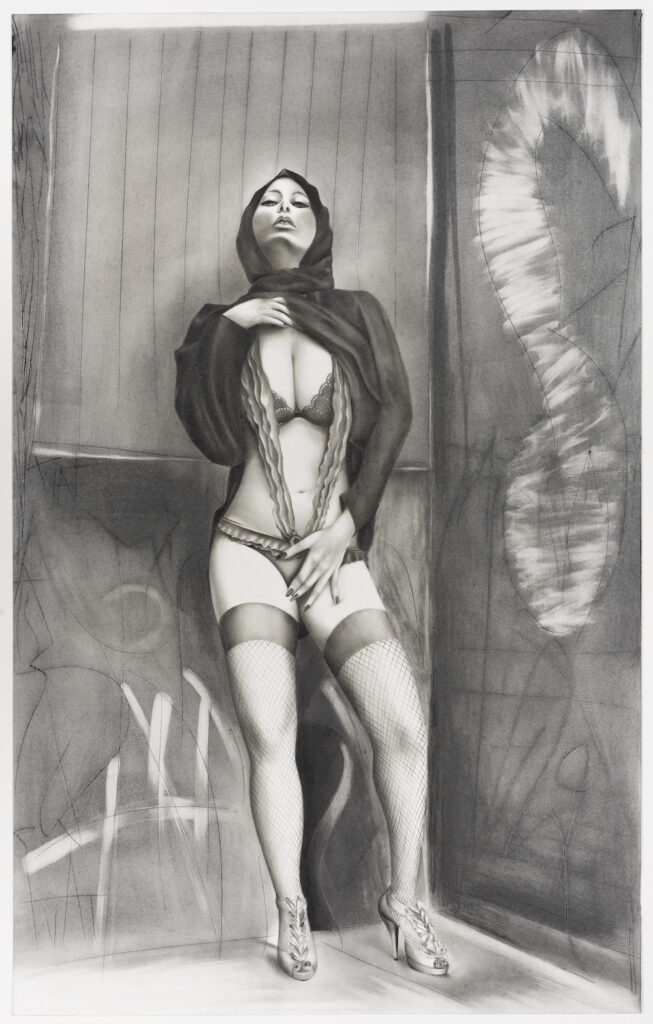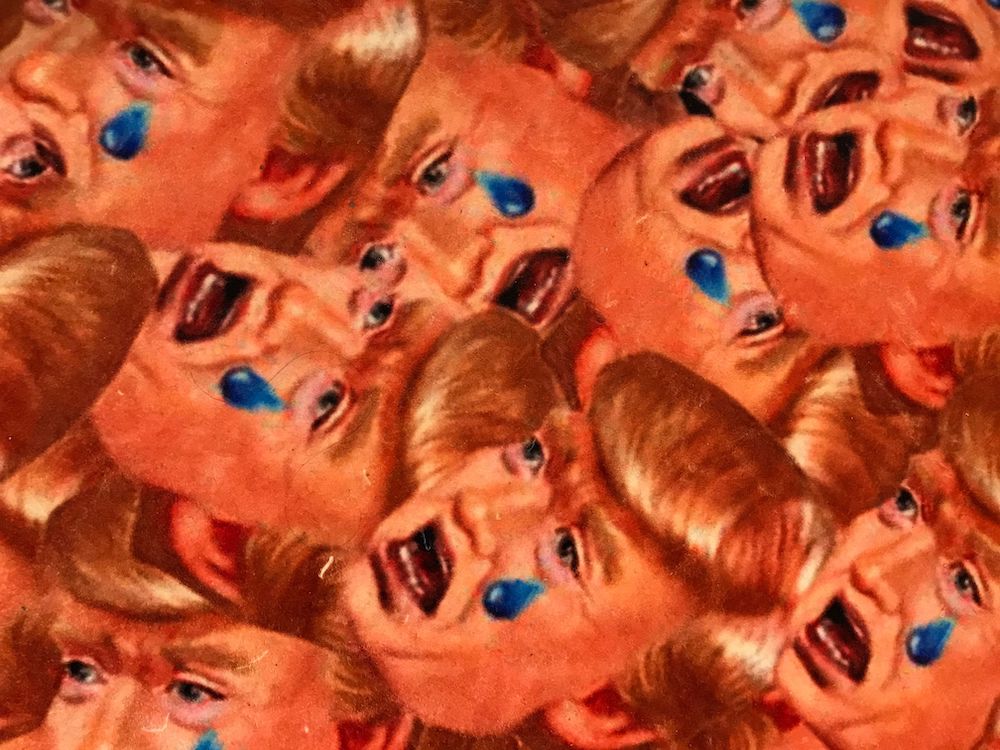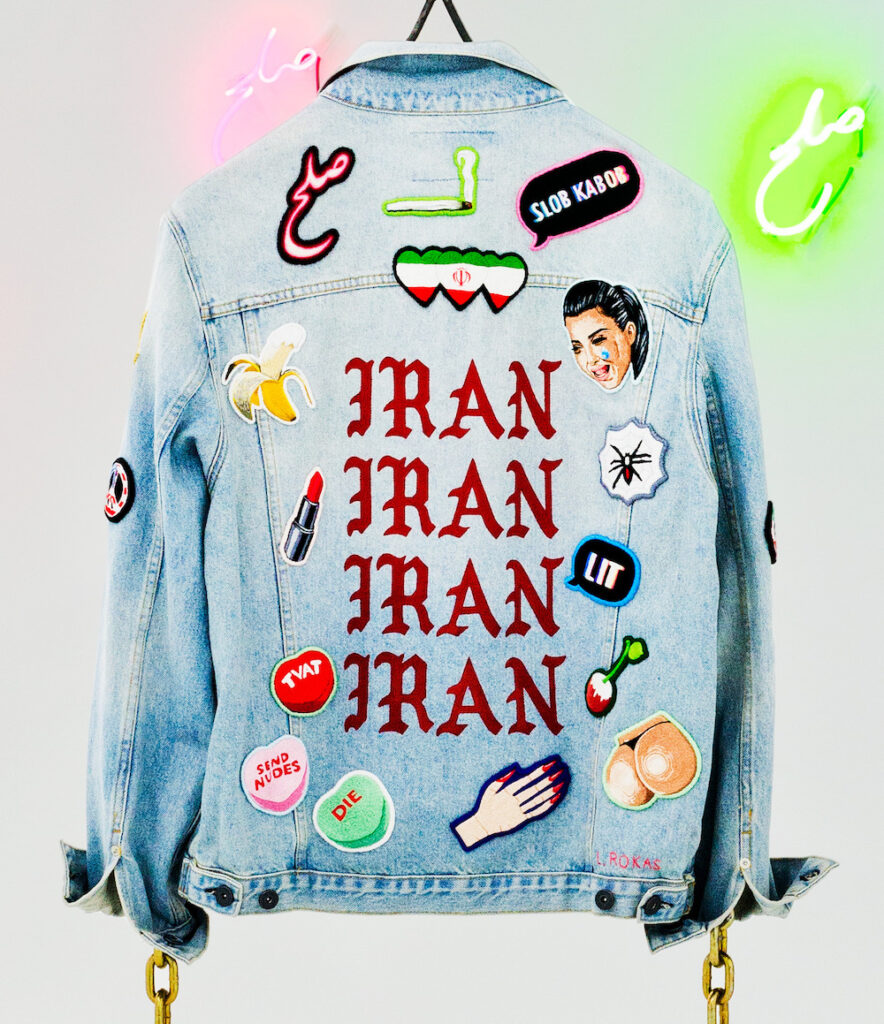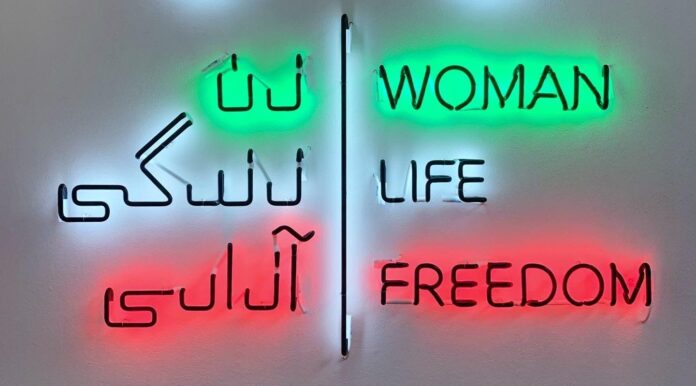Taravat Talepasand’s first name means the smell when the first spring rain lands on flowers. Fittingly, the artist tries to bring a certain freshness to thinking about what it means to be an Iranian woman in America. Her current show “طراوت | TARAVAT” (which runs through July 23 at Yerba Buena Center for the Arts), weaves together cultural identity, childhood, and the adult quest to make sense of it all.
In the outer areas of the YBCA gallery, 10-year-old Talepasand performs Persian dance, captured in several recordings of public access television shows. A neon sign reads “Women Life Freedom” in Farsi and English.
“This is a very important protest slogan that started late in 2022 and is continuing today,” Talepasand told 48hills. “It’s not just the freedom for women, it’s also for LGBTQ + communities in Iran. It’s really a fight against the regime.”

Venturing further into the gallery, visitors take in scenes from her quest to process the Iranian-American double identity. On a recent visit to the show, Talepasand stands in front of “Blasphemy IX,” a drawing that drew protest from some Muslim students at Macalester College in Minneapolis. They started a petition to have the work removed, and some of her pieces were temporarily covered with a black curtain.
“These drawings here that were censored at Macalester College have a woman in burqa showing her lingerie underneath,” Talepasand said. “This is actually based on an Iranian writer, Roxana Shirazi, who wrote her memoir, The Last Living Slut, basically exposing her journey and her trauma of sexual assault in Iran in a Muslim household.”
Taravat, who grew up in Portland, Oregon and attended the Rhode Island School of Design and San Francisco Art Institute, says she understands how some of the students in Minnesota got upset. But her intent was to connect, not shock, she says.
“They have feelings and a right to feel those feelings,” she said. “But I think that if you really dive into the many layers and the narratives and further context about the work, you’ll know that I’m not just making this up willy-nilly—this really is deep research, and me connecting with other women and other stories.”

Another piece, “Trump Runner,” shows a rug covered with Trump’s face with a single tear. A jean jacket entitled “Iran Iran Iran Iran” hangs above the rug, its back covered with multiple prints of the word “Iran” and pop culture iconography of Kim Kardashian’s crying face, a candy heart that says “send nudes.”
Help us save local journalism!
Every tax-deductible donation helps us grow to cover the issues that mean the most to our community. Become a 48 Hills Hero and support the only daily progressive news source in the Bay Area.
Talepasand laughed while saying you can’t miss the rug when you walk into the gallery, with its “Cheeto orange man who is crying.” She referred to the denim jacket above it as a kind of armor, a way of showing who you are as an Iranian.
“It really is about the complexities of church and state, and also, this hyphenated life,” she said. “Whether it is first generation, second generation, whatever it may be, you feel you have this generational connection to another part of the world—but you’re living in America.”
The images of Trump and the patches on the jacket come from the Kim Kardashian app Kimoji, Taravat said.
“There was this crackdown called Project Spider where they were arresting women in Iran that they felt looked like Kim Kardashian,” Talepasand says. “They actually thought that Kim Kardashian was creating some kind of coup to infiltrate women in Iran, and this was absolutely absurd, as absurd as these Kimojis.”

A painting of a teddy bear and a Ken doll is titled “Mohammed and Jesus.” Both the objects were hers when she was little, Talepasand says, and a 2007 incident in Sudan with a British teacher inspired the painting. The teacher gave a teddy bear to a child in her class who was in the hospital. When she asked the class what to name the bear, the students said Mohammed.
“Afterwards, the parents at the school were just livid about the fact that she had allowed the teddy bear to be named Mohammed,” the artist said. “She was arrested, she had lashings, and she was sent back to the UK. That story really stuck with me.”
Located at the crux of art traditions, Taravat says she uses both Eastern and Western methods in her work. For example egg tempera, which is used in both Persian miniatures and European painting. With her work, she wants to create connection.
“It’s not that I am this rebellious woman in America, trying to make work that makes people feel angry or frustrated or appalled,” she said. “I want people to feel something and if you feel something, that’s a win.”
طراوت | TARAVAT runs through July 23. Yerba Buena Center for the Arts, SF. More information here.





